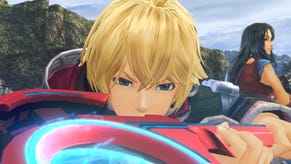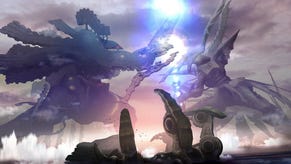Game of the Week: Xenoblade Chronicles
Two worlds.
With each passing year, the Gamescom convention in Cologne in August provides a more fascinating contrast with E3's marketing blowout in Los Angeles two months earlier. This week has been no exception.
Arriving later in the year, Gamescom is inevitably slightly less sexy to the news-hungry media, including our own site. There are fewer big game debuts (although even E3 is getting light on those), and of the console platform holders, Nintendo ignores it altogether and Microsoft keeps it at arms' length.
But while it's still an important event for trade and press, the true significance of Gamescom is as a public show. By reflecting the concerns of the games-playing audience - and importantly, the games-playing audience outside of the US (and to some extent the UK, a cultural mirror to America in games as in so many other things) - Gamescom presents a very different view of the gaming landscape.
The most striking thing is the primacy of the PC. Without a voice (read: budget) in the PR and marketing blitz of E3, it tends to get drowned out, but Gamescom's more democratic stage presents it as what it still is and probably always will be: the world's most popular gaming platform.
It's so telling that Blizzard and Valve - two of the most famous, successful, powerful and loved developers in the world - skipped E3 this year and threw their considerable weight behind the German show. And it's natural that Valve should choose it as the stage on which to unveil Dota 2, its entry in an immense and genuinely global gaming phenomenon that has until recently escaped the commercial games industry completely.
At Gamescom, Nintendo is a nobody and NCsoft - showing Guild Wars 2 and WildStar, two impressive tilts at World of Warcraft's online gaming dominance - is a big player. It's like a parallel universe - but it's every bit as real as the one presented by E3, if not more so. Like it or not, this is gaming's future.
And what of the world we're leaving behind? It looks an awful lot like our game of the week.
Xenoblade Chronicles
A Japanese role-playing epic on a Nintendo home console; if this were 1995, Xenoblade Chronicles would be one of the biggest games of the year. In 2011, it's no more than an obscure prelude to gaming's high season (and in a strange twist of fate, it's the US, not Europe, that's denied a release these days).
Maybe that will make you wistful, but the great thing about Xenoblade is that it's no nostalgic indulgence. It's a vital and fresh game, bursting with life and ideas - and determined to follow Final Fantasy XII's attempt to drag Japanese RPGs into the modern age, an attempt bafflingly ignored by everyone else, including Square Enix itself.
"Here is an endlessly lavish, detailed production based in a newborn universe that is not only filled with unfamiliar faces but also brims with daring ideas and mechanics," wrote Simon in our Xenoblade Chronicles review. "Indisputably, this Wii game - released in the twilight months of its host console - is the strongest JRPG to emerge in years. Its vision is so bold and assured that it's difficult to imagine how such a creature could have risen from this brackish swamp of a genre."
The PS3 and Xbox 360 no doubt have prettier examples of this genre with superior production values, but they have none as immediate, free-flowing and forward-thinking as this; none as stuffed to bursting with detail and systems and content.
Maybe Xenoblade Chronicles presents a path that games - Japanese games in particular - have now missed their chance to follow. But at its heart is the simple joy of being invited to explore a world beyond imagining, and that's something universal to video games, something we mustn't lose sight of. If we can hold on to that, it doesn't matter how we're getting there.




